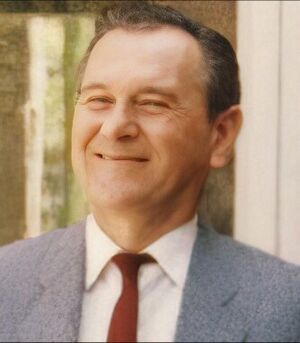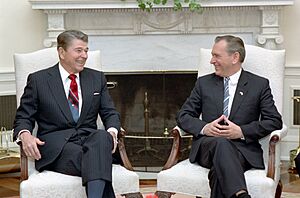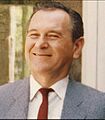Károly Grósz facts for kids
Quick facts for kids
Károly Grósz
|
|
|---|---|

Károly Grósz in 1987
|
|
| General Secretary of the Hungarian Socialist Workers' Party | |
| In office 22 May 1988 – 26 June 1989 |
|
| Preceded by | János Kádár |
| Succeeded by | Rezső Nyers |
| Chairman of the Council of Ministers of the People's Republic of Hungary | |
| In office 25 June 1987 – 24 November 1988 |
|
| Chairman of the Presidential Council | Károly Németh Brunó Ferenc Straub |
| Preceded by | György Lázár |
| Succeeded by | Miklós Németh |
| Personal details | |
| Born | 1 August 1930 Miskolc, Hungary |
| Died | 7 January 1996 (aged 65) Gödöllő, Hungary |
| Political party |
|
Károly Grósz (born August 1, 1930 – died January 7, 1996) was a Hungarian communist politician. He served as the leader of the Hungarian Socialist Workers' Party from 1988 to 1989. This was a very important role in Hungary at that time.
Early Political Career
Károly Grósz was born in Miskolc, Hungary. He joined the Hungarian Communist Party in 1945 when he was just 14 years old. The Communist Party gained full control of Hungary in 1949. Grósz quickly moved up in the party. He became an important leader in his home region.
He was in charge of the Department of Agitation and Propaganda in his county from 1954. This department was responsible for spreading the party's messages. He kept this role during the Hungarian Revolution of 1956. During this time, he stopped local newspapers from reporting on the events. He also made them remove the Kossuth Coat of Arms from their papers. After the revolution was stopped on November 4, 1956, Grósz was put in charge of the local communist party office.
In 1974, he became the head of the Department of Agitation and Propaganda for the main ruling party. In 1979, Grósz was chosen as the first secretary of the party committee in his home county. He returned to national politics in 1984. He became the head of the party committee in Budapest, the capital city.
At the next big party meeting in 1985, he became a member of the Politburo. This was a very powerful group of leaders. In 1987, he became the Prime Minister of Hungary. This was the second most powerful job in the country. People both in Hungary and other countries were happy about Grósz becoming Prime Minister. They saw him as a younger and more energetic leader.
Leading Hungary's Changes

Hungary was facing money problems and people were becoming unhappy. The older party leader, János Kádár, decided to step down. In May 1988, a party meeting chose Grósz as the new General Secretary. This happened on May 22, 1988.
Grósz wanted to make careful changes to the country's political and economic systems. He called this a "model change." He believed this would improve the communist system without completely changing its main ideas. This was different from some other leaders. They wanted a "system change," which meant replacing communism with a Western-style system.
Grósz stayed as Prime Minister until November 24, 1988. Then, Miklós Németh took over. Németh was part of a group that wanted more radical changes.
As 1989 went on, Grósz's influence became less important. Other leaders in the party, like Németh, Rezső Nyers, Gyula Horn, and Imre Pozsgay, wanted faster changes. They aimed to create a more open political system and a market economy in Hungary. Grósz tried to slow down these big changes. He did not want to bring back the good name of Imre Nagy. Nagy had been Prime Minister during the 1956 revolution and was later executed.
Grósz's position weakened when he met with Romanian leader Nicolae Ceaușescu. They talked about what to do with many ethnic Hungarians who had left Romania. Many of Grósz's party colleagues felt he trusted Ceaușescu too much. This caused him to lose a lot of his authority.
On June 26, 1989, Grósz became one of four members of a group leading the party. This group was led by Nyers. Grósz was still General Secretary, but Nyers was now seen as the main leader of Hungary. Grósz did not agree with the idea of changing the party into a social democratic party. He remained General Secretary until October 7, 1989. On that day, the party changed its name to the Hungarian Socialist Party.
Later Life and Legacy
The group of leaders who supported Grósz lost at the party meeting. In December 1989, they formed a new party called the Hungarian Socialist Workers' Party. Grósz was its first acting chairman. This party later changed its name to the Workers' Party.
This new party did not win any seats in the Hungarian Parliament. This happened in the first multi-party election in the new Republic of Hungary. These elections took place on March 25 and April 8, 1990.
Károly Grósz passed away on January 7, 1996. He was 65 years old and died from kidney cancer in Gödöllő, Hungary.
Images for kids
 | May Edward Chinn |
 | Rebecca Cole |
 | Alexa Canady |
 | Dorothy Lavinia Brown |



